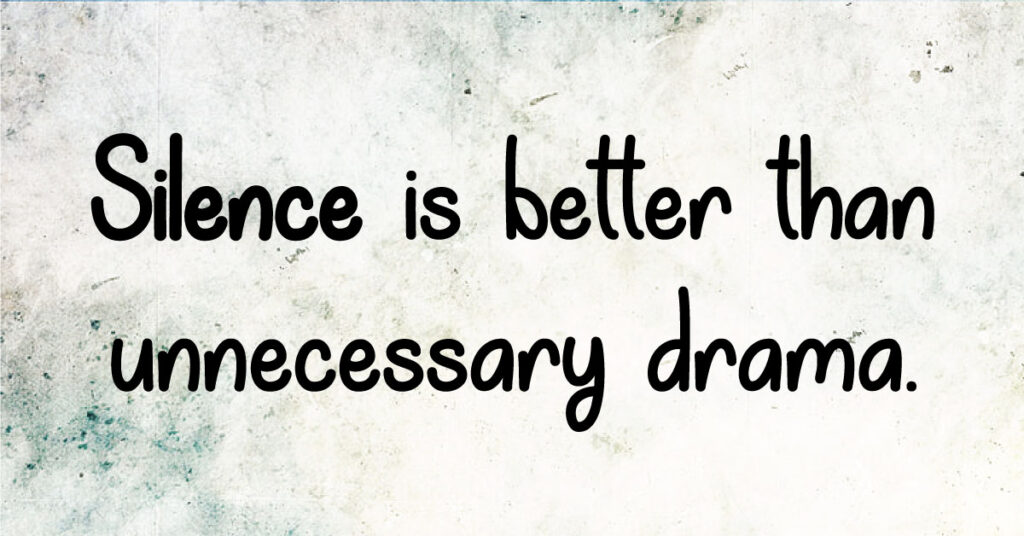Being direct means expressing your thoughts and feelings in a clear and honest way without mincing words or beating around the bush. It means having the courage to speak up and communicate your needs and boundaries in any situation.
If you are a straightforward woman who is unafraid to be direct, many people will label you as someone who is determined, confident, and honest. They will see you as someone who can handle difficult situations with ease, and who is not afraid to take charge when necessary.
However, being direct can also have its downsides. Some people may see you as overly aggressive or confrontational or may be intimidated by your confidence and assertiveness. It can be challenging to strike a balance between being direct and maintaining positive relationships with others.
Being direct is a powerful tool, but it must be used thoughtfully and with consideration for those around you. If you can find a way to be straightforward without being harsh or aggressive, you will earn the respect of others and build strong relationships based on genuine communication and mutual understanding.
However, being a straightforward person can be tough. Even though it’s important to express thoughts and feelings honestly, being direct can lead to some challenges in life. You may endure struggles for being direct which can range from mild to severe.
Here are some examples of the struggles one might face while being straightforward
People may think that you are rude or abrupt
As a straightforward woman, it can be hard to navigate social situations without being viewed as too blunt. Because society often values women who are more nurturing and indirect, it can be especially challenging to assert your thoughts and feelings without being perceived as rude or abrasive. However, it’s important to remember that being upfront and honest about your emotions is a valuable quality. Rather than trying to change who you are to conform to societal norms, it’s better to communicate your message in a way that is authentic to you while also being mindful of how it might come across to others.
Ultimately, by emphasizing your intentions and kindness, it is possible to find a balance between directness and empathy that allows you to express yourself while still being respectful to others.
You may come across as intimidating or aggressive
As a straightforward woman, you may sometimes come across as intimidating or aggressive, even when that’s not your intention. This is because directness can be perceived as a sign of assertiveness, which can sometimes be seen as threatening. However, it’s important to remember that being assertive is not the same thing as being aggressive or intimidating. Being assertive means standing up for yourself in a confident and respectful way while being aggressive means trying to dominate or belittle others.
To avoid being seen as intimidating or aggressive, it can be helpful to focus on your body language and tone of voice. By using an open and relaxed posture, and speaking in a calm and measured tone, you can help others to see that you are simply confident and direct, rather than threatening or hostile.
Friends or family members may feel like you’re always prying
You may find that your friends or family members feel like you are always prying. This is because straightforwardness can sometimes come across as a desire for information or control, even if that is not your intention. It’s important to remember that while expressing your thoughts and feelings is valuable, it’s also important to respect others’ boundaries and privacy. To avoid coming across as prying, try to frame your questions or conversations in a way that emphasizes your care and concern for the other person.
For example, you might say “I’m curious about your experience because I care about you and want to understand how you feel.” By expressing your motivation in a positive way, you can help others to see that your directness is coming from a place of empathy, rather than a desire for control
Directness can sometimes lead to misunderstandings
Directness can sometimes lead to misunderstandings, especially if the person you are communicating with does not share the same communication style as you. When you are straightforward, you can be vulnerable to being misunderstood. This is because people often take what they hear as literal, making directness a risky technique. To avoid misunderstandings, it’s essential to be crystal clear about what you mean by the words you use. Practice checking in with those you’re speaking with to ensure that they are understanding your meaning accurately.
Remember that misunderstandings happen all the time, so, when they do, it’s important to approach them with patience and a willingness to listen. Direct communication can be valuable, but only if both parties understand each other.
Others may feel like you’re too blunt
As a straightforward woman, it’s important to be aware that others may perceive you as being too blunt. This can happen because direct language can be interpreted as being overly critical or insensitive. While it’s valuable to express your thoughts and feelings honestly, it’s also important to be mindful of how your communication style is coming across to others. To avoid coming across as too blunt, consider using more diplomatic language when expressing your opinions. Additionally, pay attention to nonverbal cues, such as tone of voice and body language, since these can also contribute to how others perceive you.
By being responsive to others’ reactions, you can strike a balance between expressing yourself honestly and being respectful of other people’s feelings. Remember, you don’t have to change who you are, but being aware of others’ reactions can help you communicate more effectively.
It can be difficult to convey kindness while being straightforward
As a straightforward woman, it can be challenging to convey kindness while being direct. This is because straightforwardness can sometimes come across as harsh or unemotional, even if that is not your intention. It’s important to remember that directness and kindness are not mutually exclusive and that it’s possible to express yourself honestly and assertively while still being empathetic and considerate of other people’s feelings. To convey kindness while being straightforward, try to focus on your tone of voice and body language. Avoid using aggressive or hostile language, and instead, use a calm and measured tone to communicate your message.
Additionally, make sure to listen actively to the other person and respond with empathy and validation. By prioritizing respectful communication and a positive attitude, it’s possible to be both direct and kind at the same time.
You may feel compelled to always speak your mind, even when it’s not necessary
There can be a temptation to speak your mind in any situation. However, it’s important to remember that just because you have an opinion on something, it doesn’t mean it’s always necessary to voice it. Being direct is important, but so is knowing when to hold back. It’s essential to practice active listening and to be thoughtful about the impact your words might have on others. Deciding when to speak up and when to keep quiet is a delicate balance, but it’s one that can be achieved through practice and self-awareness.
Remember that sometimes silence can be just as powerful as speaking up and that it’s okay to take a moment to collect your thoughts before jumping in with your perspective. By being intentional with your communication, you can ensure that your message is heard in the most effective way possible.
It can be tough to find a balance between being assertive and aggressive
Finding the balance between being assertive and aggressive can be difficult. Being assertive means standing up for yourself and expressing your opinions in a confident and self-assured way. However, when assertiveness is taken to an extreme, it can become aggressive and come across as intimidating or offensive. It’s essential to be mindful of how your words and actions might be perceived by others so that you can strike a balance between being direct and being respectful. Being assertive while still being empathetic and understanding can go a long way in ensuring that your point is heard while also maintaining positive relationships.
By focusing on your tone, body language, and word choice, you can assert yourself without crossing into aggressiveness, allowing your straightforwardness to be an asset rather than a hindrance
You might struggle with building, nurturing and maintaining personal relationships
Directness can be intimidating to some and may not be well-received by those who prefer indirect communication. It’s important to recognize that relationships require balance, compromise, and a willingness to listen. Being straightforward in your communication is important, but so is being empathetic and understanding of others’ needs. Practice active listening and validation skills to make sure you are fully understanding the other person’s perspective.
Additionally, avoid being overly critical or harsh in your language, which can harm your relationships. By actively working to build personal relationships, showing empathy, and expressing yourself in a way that is clear but not offensive, you can maintain strong relationships that will last for a long time.
Your directness may be viewed as arrogance by some people
There’s a possibility that some people might view your directness as arrogance. This happens because straightforward people are often perceived as confident, which can sometimes come across as over-confidence. It’s essential to understand that being honest and direct doesn’t mean that you’re overconfident or arrogant; it’s just part of who you are. However, it’s crucial to be aware of how your words and actions might be perceived by others. Try always to express your thoughts and feelings in a calm and measured way, and be sure to recognize the value of other people’s opinions.
Additionally, avoid being condescending or critical in your language, and try to be mindful of your tone and body language. By communicating effectively and respectfully, you can ensure that your directness is not misinterpreted as arrogance.
It can be challenging to know when and how to be tactful
Tact is an essential skill that enables one to communicate frankly without hurting someone’s feelings. It requires being aware of social customs and choosing words carefully to ensure that your message is heard while not being offensive. To develop your tact skills, be aware of your tone and body language while communicating. Avoid using negative or sarcastic language that may come across as hostile. Instead, use affirming language, express empathy, and validate the other person’s feelings. It’s also crucial to pick your battles and recognize when directness may be detrimental to a particular relationship or situation.
By understanding when to be more tactful and using affirmative language, you can better convey your message without hurting someone’s feelings while staying true to who you are as a straightforward person.
You may feel like people are always on the defensive around you
You may sometimes feel like people are always on the defensive around you. This is because your directness may be interpreted as criticism or aggression. It’s essential to understand that while being direct is valuable, it’s essential to frame it positively and respectfully. When communicating, focus on keeping a neutral tone, avoid using critical language, and offer positive feedback when appropriate. It’s also crucial to practice active listening and validate others’ feelings, helping them feel heard and understood. Being patient and empathetic can win over their hearts and minds, reducing their defensiveness and creating a more positive and productive exchange.
By emphasizing respect, positivity, and empathy and actively practicing these in your communication, you can build relationships based on direct and truthful communication that is less likely to leave others feeling defensive.
Final thought
Being a straightforward woman in today’s world can be challenging due to various perceptions that may arise from the way people communicate. Directness is often misinterpreted as rudeness, criticism, or aggression. However, it’s vital to practice honest communication while being aware of the impact of our words and actions on others. Building mutually respectful relationships and practicing active listening can help reduce misunderstandings, and validating others’ feelings can help them feel heard and understood.
While it’s difficult to know how to balance being assertive and aggressive, it’s essential to recognize that communication requires tact and diplomacy to achieve the desired outcome. Still, directness can be an asset as long as it is expressed positively and respectfully, leading to more productive discussions and authentic relationships.








